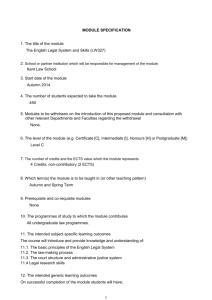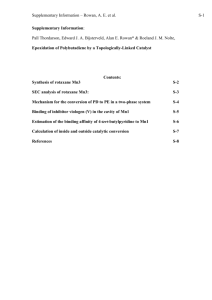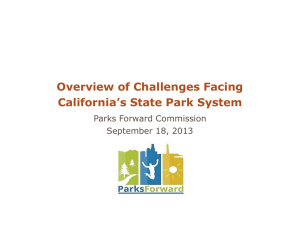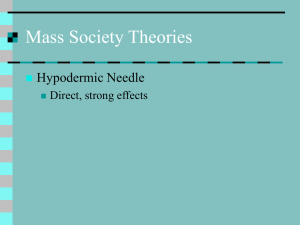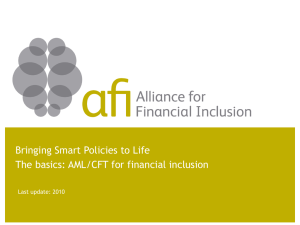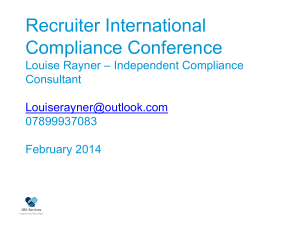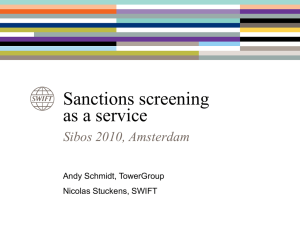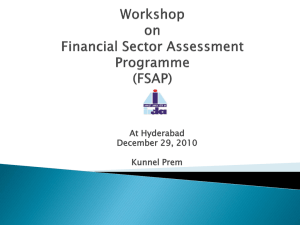AML/CFT Handbook training - Jersey Funds Association Jersey
advertisement
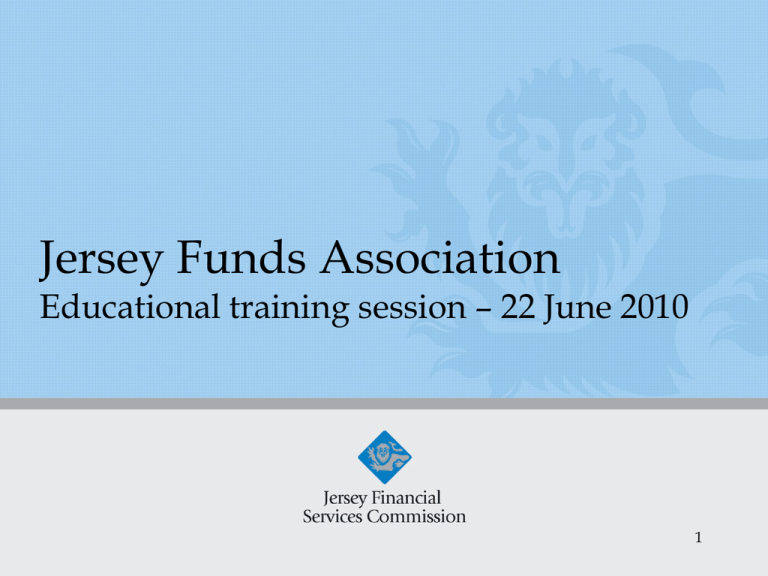
Jersey Funds Association Educational training session – 22 June 2010 1 Overview • Dealing with intermediaries and introducers – Requirement to carry out identification measures – Concessions available under Articles 16 and 17 of the Money Laundering Order (“MLO”) – Significance of jurisdictional equivalence • Dealing with suitable certifiers • Some areas where clarification requested 2 Dealing with intermediaries and introducers 3 Scope of identification measures • Article 3(2)(a) of the MLO – Identify and verify the identity of the customer 4 Scope of identification measures • Article 3(2)(c) of the MLO – In respect of a customer that is not an individual: • Identify and verify the identity of any person purporting to act on behalf of customer and verify the authority of that person to do so • Understand the ownership and control structure of the customer and the provisions under which the customer can enter into contracts • Identify and verify the identity of each individual who is the customer’s beneficial owner or controller 5 Scope of identification measures • Article 3(2)(b)(i) and (ii) of the MLO – Determine whether the customer is acting for a third party and, if so: • Identify and verify the identity of that third party • Where third party is a legal person, understand the ownership and control of that legal person • Identify and verify the identity of each individual who is the legal person’s beneficial owner or controller 6 Scope of identification measures • Article 3(2)(b)(i) and (ii) of the MLO – Determine whether the customer (the trustee) is acting for a third party and, if so: • Identify and verify the identity of that third party • Where third party is a trust, understand the nature of the legal arrangement (e.g. type of trust) • Identify and verify the identity of each person who falls within Article 3(7) • Where a person who falls within Article 3(7) is a legal person, identify and verify the identity of each individual who is the legal person’s beneficial owner or controller 7 Identification measures concessions • Article 17 of the MLO – Allows a relevant person to establish a relationship without collecting information on the third parties for which an intermediary acts (exemption from Article 3(2)(b)) – Concession applies only: • to intermediaries that: – are registered to carry on deposit-taking business, insurance business, investment business, or fund services business; or – hold a fund permit or certificate • where relevant person “thinks fit” 8 Identification measures concessions • Article 16 of the MLO – Allows a relevant person to rely upon information and evidence of identity that has already been collected and which is held by an introducer or an intermediary) • Rather than request that same information and evidence again (duplication of effort) • Evidence held may not be current – Concession applies to following information and evidence of identity that has already been collected: • Introducer – Article 3(2)(a) to (c) • Intermediary – Article 3(2)(b) 9 Identification measures concessions • Article 16 of the MLO – Concessions only apply where: • Third party carries on Schedule 2 business and is supervised under the Proceeds of Crime (Supervisory Bodies) (Jersey) Law 2008 • Relevant person “thinks fit” • Third party consents to being relied upon 10 Identification measures concessions • Article 16 of the MLO – Concessions only apply where (cont’d): • Relevant person obtains adequate assurance in writing from third party – That it has applied identification measures – That it holds evidence of identity – That it will provide that evidence without delay and on request » Section 4.10.3 of AML Handbook provides for 5 working days – In the case of introduced business, that each customer introduced is an existing customer of the introducer 11 Identification measures concessions • Application of Articles 16 and 17 of the MLO to non-Jersey introducers and intermediaries – References to “person who carries on equivalent business” – defined in Article 5 – It is business: • that is carried on outside Jersey • that would be Schedule 2 business if carried on in Jersey • that may only be carried on by a person that is registered to do so (or otherwise authorised) 12 Identification measures concessions • Application of Articles 16 and 17 of the MLO to non-Jersey introducers and intermediaries (cont’d) • the conduct of which is subject to AML/CFT requirements that are consistent with the FATF Recommendations and supervised for such compliance by an overseas regulatory authority – Requirements and supervision set directly through legal framework 13 Identification measures concessions • Application of Articles 16 and 17 of the MLO to non-Jersey introducers and intermediaries (cont’d) – Guidance in Section 1.7 of AML Handbook • Basis for determining equivalence – Generally – whether a country or territory is a member of the FATF, FATF-Style Regional Body, Member State of the EEA, or another Crown Dependency 14 Identification measures concessions • Application of Articles 16 and 17 of the MLO to non-Jersey introducers and intermediaries – Guidance in Section 1.7 of AML Handbook • Basis for determining equivalence – Specifically – whether a country or territory is “compliant” or “largely compliant” with those FATF Recommendations that are directly relevant to the application of available concessions: Recommendations 5-11, 13-15, 18, 21, 23 and Special Recommendations IV and VII – Following sources used to determine compliance: » Laws and instruments » Independent assessments » Other public information 15 Identification measures concessions • Application of Articles 16 and 17 of the MLO to non-Jersey introducers and intermediaries – Guidance in Section 1.7 of AML Handbook • Appendix B – List of countries and territories considered by Commission to have set requirements for measures to be taken by their financial institutions (“FIs”) to forestall and prevent ML and TF that are consistent with the FATF Recommendations – Not an exhaustive list and no conclusions should be drawn from omission » Relevant persons may assess countries or territories not listed in Appendix B 16 Identification measures concessions • Application of Articles 16 and 17 of the MLO to nonJersey introducers and intermediaries – Appendix B – Be aware also of Appendix D – jurisdictions that are covered by a statement from an international body Appendix B – Equivalent countries and territories Appendix B provides a list of countries and territories that are considered by the Commission to have set requirements for measures to be taken by their domestic financial institutions and designated non-financial businesses and professions to forestall and prevent money laundering and the financing of terrorism that are consistent with those in the FATF Recommendations. This is not intended to be an exhaustive list of such countries and territories, and no conclusions should be drawn from the omission of a particular country or territory from the list. (See section 1.7). Australia Italy Austria Japan Belgium Latvia Bulgaria Liechtenstein Canada Lithuania Cayman Islands Luxembourg Cyprus Malta Czech Republic Netherlands (excluding Netherlands Antilles and Aruba) Denmark New Zealand Estonia Norway Finland Portugal France Romania Germany Singapore Gibraltar Slovakia Greece Slovenia Guernsey South Africa Hong Kong Spain Hungary Sweden Iceland Switzerland Ireland United Kingdom Isle of Man United States 17 Identification measures concessions • Article 17 of the MLO - significance of jurisdictional equivalence – Simplifies identification measures – Similar concessions available in “competitor” jurisdictions 18 Identification measures concessions • Article 16 of the MLO – significance of jurisdictional equivalence – Simplifies identification measures • Information on customer is collected just once • Evidence of identity need not be collected afresh • “Paper chase” may be avoided – Evidence passed by an intermediary or introducer must be confirmed by the third party as being a true copy of either an original or copy document held on its file 19 Identification measures concessions • Article 16 of the MLO – significance of jurisdictional equivalence – May avoid requirement to apply enhanced measures where customer has not been physically present for identification measures • On basis that customer is known to introducer – Similar concessions available in “competitor” jurisdictions 20 Identification measures concessions • Articles 16 and 17 of the MLO - significance of jurisdictional equivalence? – Focus is on AML/CFT measures applied at FIs, rather than a wider compliance with FATF Recommendations – Concessions are limited to identification measures • Not Article 3(2)(d) – obtaining information on the purpose and intended nature of a business relationship 21 • Not ongoing monitoring Identification measures concessions • Articles 16 and 17 of the MLO - significance of jurisdictional equivalence? – Not universally used - some FIs do not place reliance on third parties outside the Crown Dependencies 22 Dealing with suitable certifiers 23 Identification measures – non-face to face • Use of suitable certifier relevant where: – Relevant person applying identification measures itself • Not where reliance is placed on measures that have already been carried out by an introducer under Article 16 of the MLO 24 Identification measures – non-face to face • Use of suitable certifier relevant where: – Customer or individuals connected to customer not physically present for identification purposes • Article 15 of the Money Laundering Order requires specific and adequate measures to compensate for higher risk of money laundering where customer is not physically present • 4.8 of AML Handbook requires additional check to reduce risk of identity fraud where individual to be identified under Article 3 of the MLO is not physically present 25 Identification measures – non-face to face • Use of suitable certifier not mandated – Other checks to reduce risk listed in 4.8 of AML Handbook, e.g. • Use of further verification sources • Funds to be drawn from an account in the customer’s name at a bank in an “equivalent” jurisdiction • “Welcome call” – Other checks may be appropriate 26 Identification measures – non-face to face • Suitable certification – Some basic rules set: • Certifier must see evidence of identity • Certifier must confirm that the copy of the evidence to be provided to the relevant person is a complete and accurate copy of the evidence seen • Where evidence contains a photograph, the certifier must confirm that the photograph contained in a document bears a true likeness to the individual requesting certification 27 Identification measures – non-face to face • Suitable certification – Some basic rules set (cont’d): • Certifier must sign and date the copy of the evidence • Certifier must provide contact information • “Know your certifier” – in any case where: – Certifier is located in higher risk jurisdiction – Things don’t look right 28 Identification measures – non-face to face • Where rules not followed – then not suitable certification • Derivatives may be acceptable, where a relevant person is satisfied that: – Evidence held is reasonably capable of verifying that the person to be identified is who the person is said to be and satisfies the person responsible for the identification that the evidence does establish that fact – Enhanced identification measures applied or additional check performed to reduce the risk of identity fraud 29 Other areas 30 Other areas • JFA – Dealing with politically exposed persons (“PEPs”) – Definition for “regulated market” – Secondary market issues • Association of Investment Companies – Secondary market issues 31 Other areas • PEPs – Effect on risk rating of customer where: • The customer is a fund that has a small number of investors that are PEPs (holding only very small interests) • The customer (a legal person) is an investor in a fund and has one or more PEP directors (acting in a public role rather than person capacity) – Range of enhanced customer due diligence measures to reflect the actual level of risk 32 Other areas • PEPs – Application of enhanced measures in the case of a relationship that has previously been subject to simplified measures • PEP identified as board member of a listed company 33 Other areas • Regulated market – Same meaning as in MiFID – In the case of EEA markets: • http://mifiddatabase.cesr.eu/ – In the case of non-EEA markets: • Article 6(1) to (4) of the Market Abuse Directive • Articles 3, 5, 7, 8, 10, 14 and 16 of the Prospectus Directive • Articles 4 to 6, 14, 16 to 19 and 30 of the Transparency Directive 34 Questions 35 Jersey Funds Association Educational training session – 22 June 2010 36
